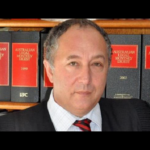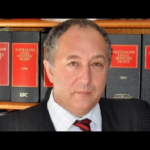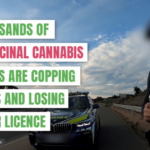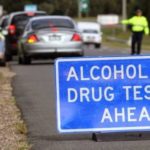Victorian Medical Cannabis Driving Reform Likely: Interview With Legalise Cannabis MLC David Ettershank

Right now, medicinal cannabis driving reform looks like it will progress through Victorian parliament, which involves an amendment that many progressive politicians have tried to see enacted in various Australian mainland jurisdictions in the past to no avail.
Cannabis medicine became legal for use on prescription nationwide in October 2016, and it was met by pre-existing drug driving regimes in each jurisdiction that criminalise driving with any trace of THC, the psychoactive component of cannabis, in a driver’s system.
This means that, unlike drivers who use other prescription drugs that can lead to impairment, those taking medical cannabis can be pulled over, tested by police, and, on turning up a positive result, they then have their licence suspended and are hit with a fine, regardless of if they’re intoxicated.
But this could all change in Victoria, as Legalise Cannabis MLC David Ettershank just introduced his Road Safety Amendment (Medicinal Cannabis) Bill 2023, which inserts a clause into the Road Safety Act 1986 (VIC) that stipulates legal prescription cannabis is not captured by drug driving laws.
An unjust system
Victoria was the first state to introduce Australia’s unjust drug driving laws in 2004. And with a few exceptions, such as Tasmania, all jurisdictions follow this model, which, in Victoria, continues to entail testing for just three drugs: cannabis, MDMA and amphetamines.
Drug driving laws have long been criticised, even before the legalisation of cannabis medicine, as unlike random breath testing which gauges levels of alcohol in a driver’s system to ascertain if they’re intoxicated and a danger to others, drug driving only tests for the presence of a substance.
This means that, as has been found in the NSW courts, a person can be charged with cannabis driving literally days after they’ve consumed the substance due to minute traces, and since cannabis medicine was legalised, those who use it can fall foul of these laws, even when they’re not impaired.
“People who have been prescribed a medicine by a registered medical practitioner, and can drive safely, should be allowed to drive,” said Ettershank, during his second reading speech on the bill. “This is how we treat every single prescription medicine in Victoria, except one, medicinal cannabis.”
Support in the right places
Ettershank’s cannabis driving reform bill is not the first of its kind to have been tabled in a mainland parliament, but it’s the first that isn’t being shot down by conservative ministers in power.
Indeed, it seems Victorian premier Daniel Andrews sees the sense in the reform.
During a presser on Tuesday, the Victorian Labor leader said that medicinal cannabis driving reform is a key priority for his government, as right now there are thousands of Victorians with a cannabis medicine script who should be allowed to drive when they’re not under its influence.
Sydney Criminal Lawyers spoke to Legalise Cannabis Victoria MLC David Ettershank about his legislation, how the current laws impinge upon drivers who use medical cannabis, and what other reforms he and fellow Legalise Cannabis MLC Rachel Payne have in their sights.
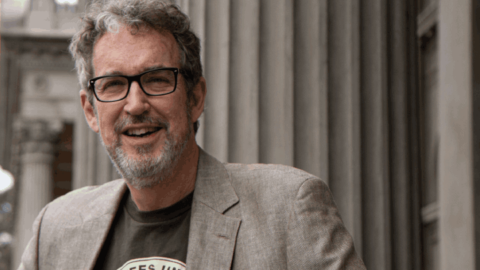
Currently, in Victoria, as in all other jurisdictions besides Tasmania, driving with any traces of THC in an individual’s system is considered drug driving, which then results in a fine and licence suspension.
This is despite medicinal cannabis having been legal nationwide since October 2016, and the use of this lawful medication leading to a positive drug driving test result.
David, what does it mean that the state government has simply left drivers who use medicinal cannabis to the whim of this unjust law for the last seven years?
This is a problem across Australia, with the exception of Tasmania. Basically, what it means for the around 75,000 people in Victoria using medicinal cannabis, is that, in many cases, they have to choose between using that prescribed medicine and driving.
For many people, that means they then have to take heavier drugs – opioids, benzodiazepines – rather than the medicine of choice, which, in many cases, is cannabis.
So, there are now around 75,000 Victorians with a cannabis script?
Yes. It is something like that. It is hard to get current figures, as there is a lot of script writing across states and various things like that. But it’s somewhere in that realm of 75,000.
It’s certainly picked up on what it was a few years ago.
Yes, it’s growing exponentially, particularly in Queensland. It has accounted for around half the new scripts.
Last month, you introduced the Road Safety Amendment (Medicinal Cannabis) Bill into the Victorian upper house.
What does your private members bill seek to achieve, and how does it do that?
It’s only about a one paragraph amendment. And all it seeks to do is add medicinal cannabis to the Road Safety Act, so it’s excluded from roadside testing.
Medicinal cannabis will be treated in much the same way as opioids, benzodiazepines and other painkillers.
To be clear, as with all of those other drugs, if you’re impaired, you shouldn’t be driving – you shouldn’t be on the road.
But if you’re not impaired, and you’ve been subject to discussions with your doctor when you got your prescription, just like every other driver on medication, if you are fit to drive, you should be able to.
So, does your law act as a defence or does it simply involve excluding cannabis from the testing regime?
Basically, the concept is if you have been prescribed medicinal cannabis you will have identification from the TGA or a copy of your script and if you are pulled over by the police and tested, you can pull out your script.
It would be no different from pulling out your script for any other medication that you’ve been prescribed.
This issue has been the subject of many such bills tabled in state parliaments around the country and they’ve all been voted down.
In your opinion, considering the proposed reform seems to be such a straightforward and just proposal, why are Australian governments continually refusing to enact it?
It’s bizarre. This change was made in Tasmania a couple of years ago, and if you google it, it isn’t news.
But it’s been happening in Tasmania, and the police are comfortable. The citizenry is comfortable, and there have been no changes to incident rates.
So, why hasn’t this reform been done in the other states? I’ll leave that to readers to contemplate.
But it’s pretty disappointing that it hasn’t been moved on. That said, there have been some pretty promising messages in the press here, coming from Victorian premier Dan Andrews.
And we’re keen to talk to Labor about how to make those changes.
You’ve prompted my next question there. The clear difference since Legalise Cannabis Victoria has put the medicinal cannabis driving reform back on the agenda is that members of the Victorian government have made comments that suggest your proposed law may be successfully passed.
So, what’s been happening in this regard?
This government has a history of reforming. It was the Andrews government that introduced medicinal cannabis in Victoria. It was the first state to do so.
There has also been a long conversation in parliament previously with Fiona Patten from the Reason Party. That involved wrestling with these problems.
There are issues that are clearly of concern to some parties, and they strike to impairment and impairment testing. And the premier referred to that in his press conference yesterday.
We are of the view, though, that the time has come. There has been a lot of research, and there’s a lot of science behind it, and what that says is medically prescribed cannabis should be treated the same as any other prescribed drug.
That’s good to hear, because in NSW a proposal like yours was voted down again recently.
Well, here in Victoria, Australia’s most progressive state, we’re very hopeful we’re going to get this one resolved soon.
At the November 2022 Victorian election, you and fellow Legalise Cannabis Victoria MLC Rachel Payne made history by being the first politicians representing a cannabis party to be voted into your state’s parliament.
What other matters do you and Rachel have your sights on besides the medicinal cannabis driving reform?
We’ve obviously got a rather broad range of items that strike to the cannabis issue, in terms of drug reform. So, we’re keen to pursue that over the course of the parliament.
There are also a lot of big social issues that need to be addressed during this parliament.
Right at the front of that queue is the whole question of bail reform. We are keen to see action on that.
We’re very keen to see action on the question of environmental change and how we adapt to that. And there’s to be an inquiry on the floods here, looking into a range of questions related to that.
Then, we’re keen to understand what’s obviously a fairly spirited reformist government, the Andrews government, and we’re looking forward to engaging on progressive social change.
And lastly, David, in light of what has been said of your proposed reform by other politicians, how are you feeling about the passage of the bill through both houses of parliament?
We’re taking this to the Legislative Council for debate on 8 March. I anticipate there will be discussions with the government before that occurs. And that will inform where we go in terms of the voting process.
We intend to pursue this vigorously, and we’re looking forward to the government meeting us halfway on this and coming up with a sensible proposal that’s going to benefit drivers in Victoria with medically prescribed cannabis.


